•
FILM SYNOPSES • 2003
The Navigators (Director: Ken Loach, 2003, 92 min)
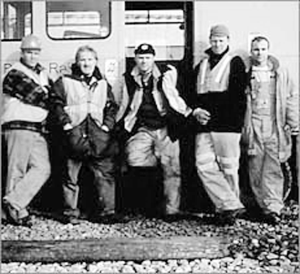 The latest film by the director of Bread and Roses, Land and
Freedom, and other award-winning films, follows the scandalous
privatization of British Rail and the resulting social, economic
and private implications for a group of rail track workers at a
Yorkshire depot. When a group of British Rail workers are told they
are being taken over by a private company their supervisor Harpic
(Sean Glenn) explains that they will have to accept new work practices.
The new company, East Midland Infrastructure, has equipped Harpic
with the predictable spin about loyalty to the company and not divulging
secrets to competitors. Workplace safety even gets a mention when
Harpic declares: "If we don't work safely we don't work at all.
Deaths have got to be kept to an acceptable level." When the workers
ask for a definition of "acceptable level" the supervisor refers
to his company notes and replies "no more than two per year."
The latest film by the director of Bread and Roses, Land and
Freedom, and other award-winning films, follows the scandalous
privatization of British Rail and the resulting social, economic
and private implications for a group of rail track workers at a
Yorkshire depot. When a group of British Rail workers are told they
are being taken over by a private company their supervisor Harpic
(Sean Glenn) explains that they will have to accept new work practices.
The new company, East Midland Infrastructure, has equipped Harpic
with the predictable spin about loyalty to the company and not divulging
secrets to competitors. Workplace safety even gets a mention when
Harpic declares: "If we don't work safely we don't work at all.
Deaths have got to be kept to an acceptable level." When the workers
ask for a definition of "acceptable level" the supervisor refers
to his company notes and replies "no more than two per year."
The film exposes the company's sinister
ploy to force the workers to take voluntary redundancy packages
and join a pool of casual agency workers with no entitlements or
safety conditions. The privatisation of the depot ends in tragedy
for the once loyal and comradely group of five workers at the centre
of the film.
The implications of the film have no
national boundaries. Similar issues, including the erosion of health
and safety conditions and employment entitlements, have affected
trade unionists and workers in Australia as a result of privatisation
and the proliferation of labour hire firms.
There are no Hollywood sets or actors
in this film. Shot on location in Yorkshire with a cast of local
actors and comics The Navigators has an authenticity not found in
many commercially produced films. The brilliant performances from
the mostly non-professional actors are fundamental to the success
of the film. The story is engaging without being overdramatised
and the political message of the film is understated but forceful
due to the powerful performances and excellent script.
First time script writer, Rob Dawber,
died in February 2001 from mesothelioma which he contracted while
working with asbestos on the railways. He worked for British Rail
for 18 years and was an active union representative until he ceased
working after privatisation of the industry in 1997. Dawber wrote
to Ken Loach about his experiences of working on the railways and
was encouraged by Loach to develop his ideas into a film script.
He was on set during the shooting of the film and saw the final
cut before he died. (Notes from laborheritage@yahoogroups.com)
Link to
Internet Movie Database (IMDb) page for The Navigators
Mother Trucker: The Diana Kilmury Story (Director:
Sturla Gunnarsson, 1996, 92 min)
 An extraordinary Canadian truck driver fights to end corruption
in her union, the International Brotherhood of Teamsters. She rallies
support and gains respect of the rank and file, organizing grass-roots
democracy through the Teamsters for a Democratic Union. Along the
way she counters sexism in the traditionally male occupation she
has chosen. Her personal life--much of it focused on helping her
son deal with his disability--is drawn into the struggle as she
must fight the union for his long-term disability. Kilmury is eventually
elected Vice President of the Teamsters on the slate with Ron Carey.
Actrress Barbara Williams who plays Diana Kilmury will introduce
the film. (Notes by Jeffrey Smedberg)
An extraordinary Canadian truck driver fights to end corruption
in her union, the International Brotherhood of Teamsters. She rallies
support and gains respect of the rank and file, organizing grass-roots
democracy through the Teamsters for a Democratic Union. Along the
way she counters sexism in the traditionally male occupation she
has chosen. Her personal life--much of it focused on helping her
son deal with his disability--is drawn into the struggle as she
must fight the union for his long-term disability. Kilmury is eventually
elected Vice President of the Teamsters on the slate with Ron Carey.
Actrress Barbara Williams who plays Diana Kilmury will introduce
the film. (Notes by Jeffrey Smedberg)
Link to
Internet Movie Database (IMDb) page for Mother Trucker
Los Trabajadores (Producer: Heather Courtney, 2002,
48 min)
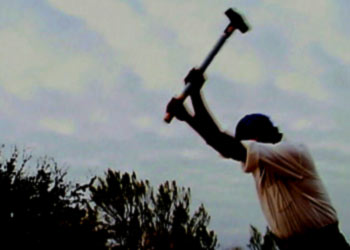 It's 1999, and the booming city of Austin, Texas keeps on growing--thanks
largely to men like Ramon and Juan, who work some of the hardest
jobs in an America that wants their labor but fails to provide legal
channels for them to immigrate and work. Through the two men's lives
and a battle over Austin's controversial local day labor program,
Los Trabajadores explores the myriad contradictions that
haunt America's dependence on and discrimination against immigrant
labor. (Notes by Steve Zeltzer)
It's 1999, and the booming city of Austin, Texas keeps on growing--thanks
largely to men like Ramon and Juan, who work some of the hardest
jobs in an America that wants their labor but fails to provide legal
channels for them to immigrate and work. Through the two men's lives
and a battle over Austin's controversial local day labor program,
Los Trabajadores explores the myriad contradictions that
haunt America's dependence on and discrimination against immigrant
labor. (Notes by Steve Zeltzer)
Link to Independent
Television Service page for Los Trabajadores
On Strike for Respect: UC Clericals and Lecturers' Strike of 2002
(Producer: Regan Brashear, 2003, 30 min) Live footage
of the historic statewide strike by clerical workers in the Coalition
of University Employees (CUE) and lecturers in the University Council-American
Federation of Teachers (UC-AFT) who protested at five campuses against
the abundant unfair labor practices of one of the largest public
employers in the state: the University of California. This fast-paced
film focuses on the strike at the UCSC campus, highlighting the
tremendous solidarity that emerged between campus and local unions,
students, and community members here in Santa Cruz and throughout
the Monterey Bay Area. (Notes by Regan Brashear)
Nine to Five (Director: Colin Higgins, 1980, 110
min)
 Jane Fonda, Dolly Parton and Lily Tomlin, three overworked and underpaid
secretaries, organize to confront their chauvinistic boss, Dabney
Coleman, in this comedic salute to all "pink collar" workers. The
issues of sexual harassment, pay inequity, excessive workload and
gender discrimination in the workplace--at the heart of this film--continue
to be relevant for many female office workers today. Our guest speaker,
Cathy Deppe, is from "9 to 5 National Association of Working Women,"
the thirty-year-old women-workers' organization that provided the
original inspiration for the making of the film Nine to Five. (Notes
by Regan Brashear)
Jane Fonda, Dolly Parton and Lily Tomlin, three overworked and underpaid
secretaries, organize to confront their chauvinistic boss, Dabney
Coleman, in this comedic salute to all "pink collar" workers. The
issues of sexual harassment, pay inequity, excessive workload and
gender discrimination in the workplace--at the heart of this film--continue
to be relevant for many female office workers today. Our guest speaker,
Cathy Deppe, is from "9 to 5 National Association of Working Women,"
the thirty-year-old women-workers' organization that provided the
original inspiration for the making of the film Nine to Five. (Notes
by Regan Brashear)
Link to
Internet Movie Database (IMDb) page for Nine to Five
Behind the Labels (Producer: Tia Lessin, 2001, 45
min)
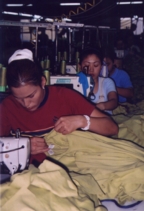 Lured by false promises and driven by desperation, thousands of
Chinese and Filipina women pay huge fees to work in garment factories
on the Pacific island of Saipan--the only U.S. territory exempt
from minimum wage and immigration laws. Powerful hidden camera footage,
along with the garment worker's personal stories, offers a rare
and unforgettable glimpse into modern-day indentured labor. Narrated
by Susan Sarandon. (Notes by DC Labor Filmfest)
Lured by false promises and driven by desperation, thousands of
Chinese and Filipina women pay huge fees to work in garment factories
on the Pacific island of Saipan--the only U.S. territory exempt
from minimum wage and immigration laws. Powerful hidden camera footage,
along with the garment worker's personal stories, offers a rare
and unforgettable glimpse into modern-day indentured labor. Narrated
by Susan Sarandon. (Notes by DC Labor Filmfest)
Link
to Films Transit International page on Behind the Labels
Hammering It Out (Director: Vivian Price, 2000,
54 min)
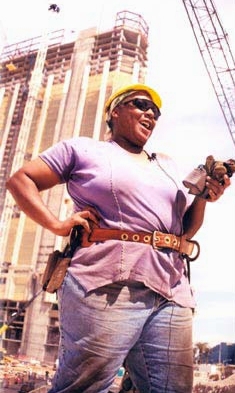 This spirited documentary spotlights the experience of women in
the building trades, specifically those women involved in the Century
Freeway Women's Employment Project in Los Angeles. Framed by the
story of a community-initiated lawsuit that resulted in hundreds
of women getting trained to work on a billion-dollar freeway project,
the film evolves into a primer on the feminist issues of equality,
identity, and changing gender roles. Powerful testimonials by the
women workers tell stories of the often unspoken gendered specifics
of discrimination in the building trades: sexual harassment at the
jobsite; negotiations about childcare and worker benefits; and the
translation of affirmative action policy to the traditional practices
of contractors and the historical conventions of the male worksite.
(Notes by Joseph Boles)
This spirited documentary spotlights the experience of women in
the building trades, specifically those women involved in the Century
Freeway Women's Employment Project in Los Angeles. Framed by the
story of a community-initiated lawsuit that resulted in hundreds
of women getting trained to work on a billion-dollar freeway project,
the film evolves into a primer on the feminist issues of equality,
identity, and changing gender roles. Powerful testimonials by the
women workers tell stories of the often unspoken gendered specifics
of discrimination in the building trades: sexual harassment at the
jobsite; negotiations about childcare and worker benefits; and the
translation of affirmative action policy to the traditional practices
of contractors and the historical conventions of the male worksite.
(Notes by Joseph Boles)
Link to Women Make Movies Film & Video Catalog page for Hammering
It Out
Matewan (Director: John Sayles, 1987, restored 2002,
132 Minutes)
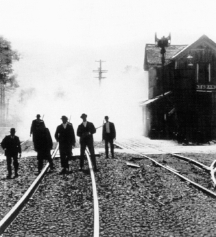 An unforgettable film of an epic 1920s miner's struggle starring
Chris Cooper and James Earl Jones, Matewan is considered
by many critics to be one of the finest independent films ever made.
John Sayle's classic is perhaps the most powerful dramatic tribute
to authentic roots of the U.S. labor movement ever filmed. Set in
the coalfields of West Virgina, the film is based on the true story
of Matewan, a miners' community that resisted the violent evictions
of workers and their families for the simple crime of joining the
United Mine Workers union. Sayles embellishes the story by adding
the central character of pacifist union organizer Joe Kenehan, played
by Chris Cooper (winner of the 2003 Academy Award for Best Supporting
Actor as the Orchid Man in Adaptation), who grapples with
relations among Appalachian miners, their Italian co-workers and
African-American would-be strike-breakers (the latter memorably
led by James Earl Jones). In fact the real heroes of Matewan were
Mayor Cabell Testerman and Sheriff Sid Hatfield, both former miners,
who stood up for their communities and paid with their lives. Testerman
was slain in the shootout that is the dramatic climax of Sayle's
film, and Hatfield later gunned down by employees of the "detective
agency" (read company thugs) that he and his community challenged
in the battle of Matewan.
An unforgettable film of an epic 1920s miner's struggle starring
Chris Cooper and James Earl Jones, Matewan is considered
by many critics to be one of the finest independent films ever made.
John Sayle's classic is perhaps the most powerful dramatic tribute
to authentic roots of the U.S. labor movement ever filmed. Set in
the coalfields of West Virgina, the film is based on the true story
of Matewan, a miners' community that resisted the violent evictions
of workers and their families for the simple crime of joining the
United Mine Workers union. Sayles embellishes the story by adding
the central character of pacifist union organizer Joe Kenehan, played
by Chris Cooper (winner of the 2003 Academy Award for Best Supporting
Actor as the Orchid Man in Adaptation), who grapples with
relations among Appalachian miners, their Italian co-workers and
African-American would-be strike-breakers (the latter memorably
led by James Earl Jones). In fact the real heroes of Matewan were
Mayor Cabell Testerman and Sheriff Sid Hatfield, both former miners,
who stood up for their communities and paid with their lives. Testerman
was slain in the shootout that is the dramatic climax of Sayle's
film, and Hatfield later gunned down by employees of the "detective
agency" (read company thugs) that he and his community challenged
in the battle of Matewan.
Sayles' central problem--pacifism versus
violent self-defense--is not an issue at this moment in our labor
movements here on the California central coast. But the connection
he portrays between mineworkers' interests and those of their communities
is sure to resonate for health care workers who can't afford their
own health insurance, for service workers who can't afford to live
in the communities they serve, for teachers confronting school closures
and growing reliance on low-wage "temp faculty," and for immigrant
workers whose work and home lives both are lived under conditions
of apartheid. The Del Mar Theatre's 7 PM May 1 showing of Matewan
is also graced by the live appearance of Gary Fritz, a third-generation
mineworker recently diagnosed with black lung disease and Deputy
Director of Organizing for the United Mine Workers of America. (Notes
by Paul Johnston)
Link to
Internet Movie Database (IMDb) page for Matewan
|
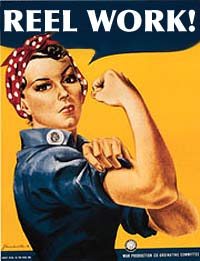
 The latest film by the director of Bread and Roses, Land and
Freedom, and other award-winning films, follows the scandalous
privatization of British Rail and the resulting social, economic
and private implications for a group of rail track workers at a
Yorkshire depot. When a group of British Rail workers are told they
are being taken over by a private company their supervisor Harpic
(Sean Glenn) explains that they will have to accept new work practices.
The new company, East Midland Infrastructure, has equipped Harpic
with the predictable spin about loyalty to the company and not divulging
secrets to competitors. Workplace safety even gets a mention when
Harpic declares: "If we don't work safely we don't work at all.
Deaths have got to be kept to an acceptable level." When the workers
ask for a definition of "acceptable level" the supervisor refers
to his company notes and replies "no more than two per year."
The latest film by the director of Bread and Roses, Land and
Freedom, and other award-winning films, follows the scandalous
privatization of British Rail and the resulting social, economic
and private implications for a group of rail track workers at a
Yorkshire depot. When a group of British Rail workers are told they
are being taken over by a private company their supervisor Harpic
(Sean Glenn) explains that they will have to accept new work practices.
The new company, East Midland Infrastructure, has equipped Harpic
with the predictable spin about loyalty to the company and not divulging
secrets to competitors. Workplace safety even gets a mention when
Harpic declares: "If we don't work safely we don't work at all.
Deaths have got to be kept to an acceptable level." When the workers
ask for a definition of "acceptable level" the supervisor refers
to his company notes and replies "no more than two per year."
 An extraordinary Canadian truck driver fights to end corruption
in her union, the International Brotherhood of Teamsters. She rallies
support and gains respect of the rank and file, organizing grass-roots
democracy through the Teamsters for a Democratic Union. Along the
way she counters sexism in the traditionally male occupation she
has chosen. Her personal life--much of it focused on helping her
son deal with his disability--is drawn into the struggle as she
must fight the union for his long-term disability. Kilmury is eventually
elected Vice President of the Teamsters on the slate with Ron Carey.
Actrress Barbara Williams who plays Diana Kilmury will introduce
the film. (Notes by Jeffrey Smedberg)
An extraordinary Canadian truck driver fights to end corruption
in her union, the International Brotherhood of Teamsters. She rallies
support and gains respect of the rank and file, organizing grass-roots
democracy through the Teamsters for a Democratic Union. Along the
way she counters sexism in the traditionally male occupation she
has chosen. Her personal life--much of it focused on helping her
son deal with his disability--is drawn into the struggle as she
must fight the union for his long-term disability. Kilmury is eventually
elected Vice President of the Teamsters on the slate with Ron Carey.
Actrress Barbara Williams who plays Diana Kilmury will introduce
the film. (Notes by Jeffrey Smedberg)  It's 1999, and the booming city of Austin, Texas keeps on growing--thanks
largely to men like Ramon and Juan, who work some of the hardest
jobs in an America that wants their labor but fails to provide legal
channels for them to immigrate and work. Through the two men's lives
and a battle over Austin's controversial local day labor program,
Los Trabajadores explores the myriad contradictions that
haunt America's dependence on and discrimination against immigrant
labor. (Notes by Steve Zeltzer)
It's 1999, and the booming city of Austin, Texas keeps on growing--thanks
largely to men like Ramon and Juan, who work some of the hardest
jobs in an America that wants their labor but fails to provide legal
channels for them to immigrate and work. Through the two men's lives
and a battle over Austin's controversial local day labor program,
Los Trabajadores explores the myriad contradictions that
haunt America's dependence on and discrimination against immigrant
labor. (Notes by Steve Zeltzer)  Jane Fonda, Dolly Parton and Lily Tomlin, three overworked and underpaid
secretaries, organize to confront their chauvinistic boss, Dabney
Coleman, in this comedic salute to all "pink collar" workers. The
issues of sexual harassment, pay inequity, excessive workload and
gender discrimination in the workplace--at the heart of this film--continue
to be relevant for many female office workers today. Our guest speaker,
Cathy Deppe, is from "9 to 5 National Association of Working Women,"
the thirty-year-old women-workers' organization that provided the
original inspiration for the making of the film Nine to Five. (Notes
by Regan Brashear)
Jane Fonda, Dolly Parton and Lily Tomlin, three overworked and underpaid
secretaries, organize to confront their chauvinistic boss, Dabney
Coleman, in this comedic salute to all "pink collar" workers. The
issues of sexual harassment, pay inequity, excessive workload and
gender discrimination in the workplace--at the heart of this film--continue
to be relevant for many female office workers today. Our guest speaker,
Cathy Deppe, is from "9 to 5 National Association of Working Women,"
the thirty-year-old women-workers' organization that provided the
original inspiration for the making of the film Nine to Five. (Notes
by Regan Brashear)  Lured by false promises and driven by desperation, thousands of
Chinese and Filipina women pay huge fees to work in garment factories
on the Pacific island of Saipan--the only U.S. territory exempt
from minimum wage and immigration laws. Powerful hidden camera footage,
along with the garment worker's personal stories, offers a rare
and unforgettable glimpse into modern-day indentured labor. Narrated
by Susan Sarandon. (Notes by DC Labor Filmfest)
Lured by false promises and driven by desperation, thousands of
Chinese and Filipina women pay huge fees to work in garment factories
on the Pacific island of Saipan--the only U.S. territory exempt
from minimum wage and immigration laws. Powerful hidden camera footage,
along with the garment worker's personal stories, offers a rare
and unforgettable glimpse into modern-day indentured labor. Narrated
by Susan Sarandon. (Notes by DC Labor Filmfest)  This spirited documentary spotlights the experience of women in
the building trades, specifically those women involved in the Century
Freeway Women's Employment Project in Los Angeles. Framed by the
story of a community-initiated lawsuit that resulted in hundreds
of women getting trained to work on a billion-dollar freeway project,
the film evolves into a primer on the feminist issues of equality,
identity, and changing gender roles. Powerful testimonials by the
women workers tell stories of the often unspoken gendered specifics
of discrimination in the building trades: sexual harassment at the
jobsite; negotiations about childcare and worker benefits; and the
translation of affirmative action policy to the traditional practices
of contractors and the historical conventions of the male worksite.
(Notes by Joseph Boles)
This spirited documentary spotlights the experience of women in
the building trades, specifically those women involved in the Century
Freeway Women's Employment Project in Los Angeles. Framed by the
story of a community-initiated lawsuit that resulted in hundreds
of women getting trained to work on a billion-dollar freeway project,
the film evolves into a primer on the feminist issues of equality,
identity, and changing gender roles. Powerful testimonials by the
women workers tell stories of the often unspoken gendered specifics
of discrimination in the building trades: sexual harassment at the
jobsite; negotiations about childcare and worker benefits; and the
translation of affirmative action policy to the traditional practices
of contractors and the historical conventions of the male worksite.
(Notes by Joseph Boles)  An unforgettable film of an epic 1920s miner's struggle starring
Chris Cooper and James Earl Jones, Matewan is considered
by many critics to be one of the finest independent films ever made.
John Sayle's classic is perhaps the most powerful dramatic tribute
to authentic roots of the U.S. labor movement ever filmed. Set in
the coalfields of West Virgina, the film is based on the true story
of Matewan, a miners' community that resisted the violent evictions
of workers and their families for the simple crime of joining the
United Mine Workers union. Sayles embellishes the story by adding
the central character of pacifist union organizer Joe Kenehan, played
by Chris Cooper (winner of the 2003 Academy Award for Best Supporting
Actor as the Orchid Man in Adaptation), who grapples with
relations among Appalachian miners, their Italian co-workers and
African-American would-be strike-breakers (the latter memorably
led by James Earl Jones). In fact the real heroes of Matewan were
Mayor Cabell Testerman and Sheriff Sid Hatfield, both former miners,
who stood up for their communities and paid with their lives. Testerman
was slain in the shootout that is the dramatic climax of Sayle's
film, and Hatfield later gunned down by employees of the "detective
agency" (read company thugs) that he and his community challenged
in the battle of Matewan.
An unforgettable film of an epic 1920s miner's struggle starring
Chris Cooper and James Earl Jones, Matewan is considered
by many critics to be one of the finest independent films ever made.
John Sayle's classic is perhaps the most powerful dramatic tribute
to authentic roots of the U.S. labor movement ever filmed. Set in
the coalfields of West Virgina, the film is based on the true story
of Matewan, a miners' community that resisted the violent evictions
of workers and their families for the simple crime of joining the
United Mine Workers union. Sayles embellishes the story by adding
the central character of pacifist union organizer Joe Kenehan, played
by Chris Cooper (winner of the 2003 Academy Award for Best Supporting
Actor as the Orchid Man in Adaptation), who grapples with
relations among Appalachian miners, their Italian co-workers and
African-American would-be strike-breakers (the latter memorably
led by James Earl Jones). In fact the real heroes of Matewan were
Mayor Cabell Testerman and Sheriff Sid Hatfield, both former miners,
who stood up for their communities and paid with their lives. Testerman
was slain in the shootout that is the dramatic climax of Sayle's
film, and Hatfield later gunned down by employees of the "detective
agency" (read company thugs) that he and his community challenged
in the battle of Matewan.